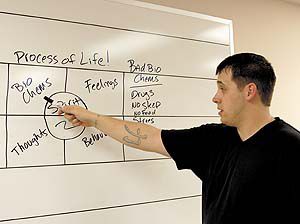| Kaylum Paletta, a counselor with Four Corners Community Behavioral Health, details the action of bio-chems within the body and mind. The cycle of bio-chems is an essential portion of the intensive outpatient program offered at the mental health center to recovering addicts residing in the Carbon County area. |
The drug abuse issue in Carbon County is not going to disappear without intervention.
To address the mounting problem associated with drugs within the community, local substance abuse treatment and rehabilitation entities have combined efforts with professional medical personal to find meaningful and lasting solutions.
Visits to emergency rooms arising from non-medical use of prescription and over-the-counter drugs rose 21 percent between 2004 and 2005, according to data compiled in a report from the Substance Abuse and Mental Health Services Administration.
Visits involving Methadone rose 29 percent, followed by prescription pain relievers, up 24 percent; and anti-anxiety medications, up 19 percent.
“Problems with prescription medication are present in more than half of the individuals I counsel,” said Four Corners Community Behavioral Health substance abuse counselor Kaylum Paletta.
Paletta has been working as a counselor for the past year at Four Corners and reports seeing everyone from kids to housewives to coal miners and the elderly come in with substance abuse issues concerning prescription medications.
Paletta indicated that over-prescription of narcotic medications start many people on the path to drug addiction.
“In my experience, it is much more likely for someone to develop a habit after being prescribed these medications than for someone to start taking these drugs on the street,” commented Paletta.
The counselor reported that the common escalation in the prescription drug scenario involves an individual starting with Lortabs or Percocets and then moving on to more concentrated medications. Among the indviduals seeking treatment, OxyContin and Methadone were the most commonly abused medications.
“This epidemic is effecting everyone in our community,” pointed out Paletta.
The growing problem is echoed by the fact that the United States Centers for Disease Control and Prevention. The CDC recently reported that the appearance of narcotic painkillers on death certificates rose 91 percent on death certificates between 1999 and 2000.
Robb Radley of the Carbon Metro Drug Task Force stated that younger individuals’ gaining access to grandparents medications is only one of the scenarios in which prescription drugs find their way into the hands of local youth.
Radley reminds all local residents to destoy or dispose of narcotic prescriptions when finished with the drugs.
The National Institute on Drug Abuse outlines that several options are available for effectively treating prescription opioid addiction.
The options are drawn from research regarding the treatment of heroin addiction and include medications such as naltrexone, methadone and buprenorphine as well as behavioral counseling approaches.
Naltrexone is a medication that blocks the effects of opioids and is used to treat opioid overdose and addiction.
Methadone is a synthetic opioid that blocks the effects of heroin and other opioids, eliminates withdrawal symptoms and relieves drug craving.
Methadone has been used successfully for more than 30 years to treat heroin addiction.
According to Paletta, the problem with Methadone for prescription drug dependency is that patients often trade one habit for another.
Locally, Four Corners has partnered with a medical doctor to advocate the use of Soboxone or buprenorphine/naloxone for the treatment of opioid dependence.
Soboxone is the first medication approved by the U.S. Food Drug Administration for treatment of opioid dependence in an office-based setting.
Buprenorphine/naloxone allows patients to be treated for the chronic brain disease of opioid dependence in the privacy of a physician’s office, with follow up take home maintenance prescriptions just as they would for other chronic conditions such as diabetes, hypertension. or depression.
Soboxone is unique among treatment options for opioid dependence. The medication is a partial opioid agonist.
Like other opioid agonists, molecules of Suboxone bind to the same opioid receptors in the brain that otherwise would bind to molecules of opioid painkillers or heroin.
Suboxone binds tightly to the receptor and is not easily displaced by other opioids.
Because it is a partial agonist the drug does not lower respiration to the same extent as a full agonist.
In addition, because Suboxone binds so tightly to the opioid receptors, patients receive minimal reinforcement if the individuals attempt to use other opioids.
While the drug effectively suppresses withdrawal symptoms it also makes it easier for patients to withdraw from its use and become totally opiate free.
Paletta makes clear one fact very clear while discussing treatment for prescription drug dependency.
Detoxification is only the first step in what amounts to a life long process.
“Addiction is a disease and mere abstinence is not recovery,” stated the counselor.
Locally, Four Corners offers a series a programs aimed at providing for the psychological treatment of the disease of addiction.
The intensive outpatient program is followed by an aftercare regimen which monitors and counsels the patient in a group environment for more than a year following their initial intake.
Additionally, patients must be recommended for treatment after interviewing with a substance abuse counselor before being admitted into the Suboxone program.
The 12-step programs offered locally are also advocated by Four Corners.
It is the mental health agency’s belief that the programs will provide recovery for life.
“Our recovery method is 12-step based because the 12 steps have been proven to work,” pointed out Nanette Orton, who is a licensed substance abuse counselor at Four Corners.
Paletta stressed the mental center agency’s commitment to successfully treating patients.
“Recovery is repairing the mind, body and emotional spirit,” concluded Paletta. “Our mission here at Four Corners is to provide the patients with the tools necessary for a day to day lifelong recovery.”

